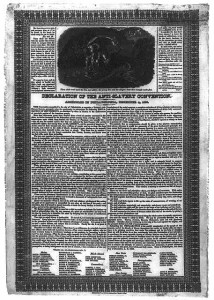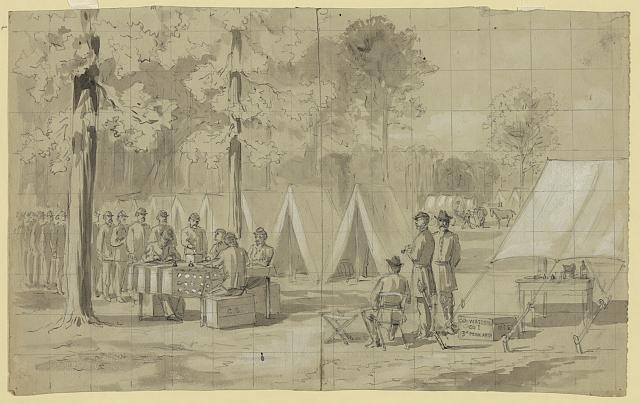Monday morning 150 years ago a Richmond paper seemed to blame the war on universal suffrage (free white men did not need property to have the right to vote). Abolitionists were tame before universal suffrage. The newspaper feared a second “violent convulsion” to teach people the folly of expanding voting rights.
From the Richmond Daily Dispatch March 20, 1865:
Monday morning…March 20, 1865.
The little village of Ashland has been favored with frequent calls from the enemy during the war. Not less than eight times has it enjoyed the exhilarating excitement of a raid, varied occasionally by skirmishes and battles.–Ashland was, of course, not forgotten during the recent visitation of General Custar [Custer]. Some of its citizens had to pay a higher price than usual for a fine equestrian spectacle, which hitherto they have enjoyed free of expense. Corn and fodder, knives and forks, and coffee-pots, were laid involuntarily upon the altar of the glorious Union. It is due to the officers to say that they endeavored to prevent these robberies, and gave orders that no private house should be entered. It is believed that they desired to enforce those orders, but found it impossible in every case to lay hold of the offenders.
It was the opinion of Mr. Sam Slick that “nothin’ on this side of the water makes so big a fool of a man as goin’ to the legislature (or Congress) without bein’ fit for it. If mankind only knew what fools they were, and how they helped folks themselves to fool them, there would be some hope of them, for they would have larn’t the first lesson of wisdom.”
Mr. Sam Slick had been to the “legislature” himself. He fancied he had a great “card,” as he called it, in “universal suffrage,” which he proposed to introduce in a State where there existed a freehold qualification. He broke down in his first speech, but he consoled himself by declaring to his friends that, though he had made himself ridiculous, “universal suffrage” was, nevertheless, “a great card. ” “I am ashamed to death of myself,” said he to a sensible old man, the minister of Slickville,–“but it was a great card I had though, if I had only played it right; a very great card indeed. In fact, it was more than a card–it was high, low, Juck [Jack?], and the game.” “What was it?” said the minister “Univarsal suffrage,” says Sam. “Do you know what that means?” said the minister. “To be sure I do,” says Sam, “it’s every man havin’ a vote and voice in makin’ those laws that is to govern him; and it comports with reason and stands to common sense.”–“Well,” says the minister, “it amounts to this, and nothing more nor less: Now men of property and character make laws to govern rogues and vagabonds; but, under your beautiful scheme, rogues and vagabonds will make laws to govern men of property and character. It is reversing the order of things; it is worse than nonsense; it is downright madness. We are fast approaching this state, without your aid, Sam, I can tell you; and when we do arrive at it, we shall be an object of scorn to point at from Europe. We shall then have wound up the fearful tragedy of our revolution with as precious a farce as folly and licentiousness ever produced.”–“Minister, ” says Slick, “I don’t know how it is, but you have such a shorthand way of puttin’ things that there is no contradictin’ you. How the plague is it that you seem always right”?–“Because I never play a card,Sam; I never consider what is expedient, but what is right; never study what will tickle the ears of people, but what will promote their welfare. You would have been all straight, too, if you had only looked to the right and wrong of the measure; but you looked to popularity, and that set you to playing a card.–Now, the upshot of this popular grumbling, or card-playing, is patriotism; and, mark my words, Sam — mark my words, my boy, for I am an old man now, and have read the human heart well — in ninety-nine cases out of a hundred patriotism is the trump card of a scoundrel.”

blame universal suufrage? – “Declaration of the Anti-Slavery Convention. Assembled in Philadelphia, December 4, 1833” (Library of Congress)
These are shocking sentiments, of course, and no one can be expected to indorse such heresies. But it is a singular coincidence, that events should seem to sustain the minister’s prediction. –Before the introduction of that excellent card, universal suffrage, the American population was as orderly and contented a population as could be found under the sun. Judges were independent, defaulting sheriffs a rarity, and abolitionism impotent for mischief, But, from the moment that the inestimable gift of universal suffrage was bestowed upon the people, things took a downward turn, and the popular madness ended at last, not in a “farce, ” but in such a tragedy as the world has rarely seen.
What the future has in store for the people of this continent it is difficult to determine. It will take more than one violent convulsion, we fear, to enable Americans to realize that men are not so infallible in wisdom and immaculate in virtue as to be safely endowed with universal suffrage.
During the Civil War voting rights were expanded to allow Union white soldiers to vote in the field:

